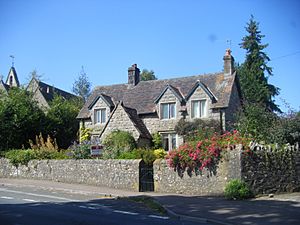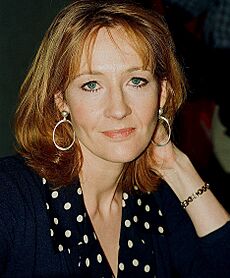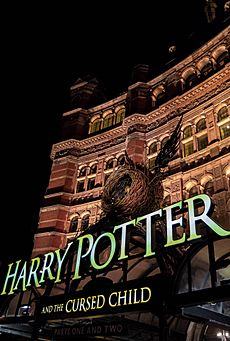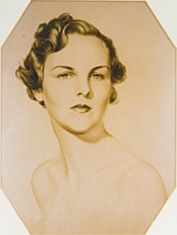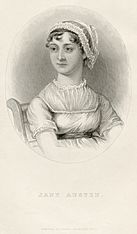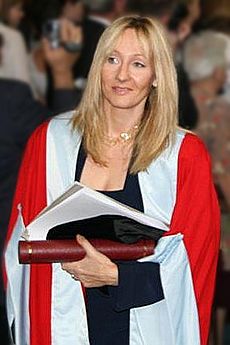J. K. Rowling facts for kids
Joanne Rowling (born 31 July 1965), known by her pen name J. K. Rowling, is a British author and helper of others. She wrote the Harry Potter series, which has seven books published from 1997 to 2007. This series has sold over 600 million copies and is translated into 84 languages. It also led to a huge global world of movies and video games. She also writes a detective series called Cormoran Strike under the name Robert Galbraith.
Quick facts for kids
J. K. Rowling
|
|
|---|---|
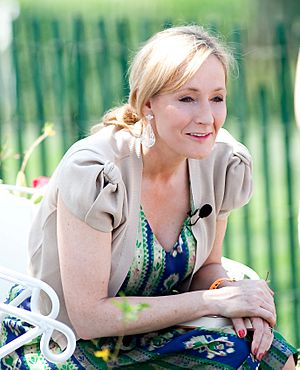
Rowling at the White House in 2010
|
|
| Born | Joanne Rowling 31 July 1965 Yate, Gloucestershire, England |
| Pen name |
|
| Occupation |
|
| Education |
|
| Period | Contemporary |
| Genres | |
| Years active | 1997–present |
| Notable awards | Full list |
| Spouse |
|
| Children | 3 |
| Signature | |
 |
|
Joanne Rowling was born in Yate, Gloucestershire. In 1990, she thought of the Harry Potter series while working for Amnesty International. After this, her mother passed away, she had her first child, got divorced, and faced financial struggles. The first book, Harry Potter and the Philosopher's Stone, was published in 1997. Six more books followed, ending with Harry Potter and the Deathly Hallows in 2007. By 2008, she was named the world's highest-paid author.
The Harry Potter books are about a boy named Harry Potter. He goes to Hogwarts, a school for wizards, and fights against Lord Voldemort. The stories explore themes like death and the battle between good and evil. The series helped make fantasy books popular for children again. It also inspired many other books and a very active fan community. Rowling has received many awards for her work. She has used her wealth and fame to support many good causes.
Contents
- About J. K. Rowling's Name
- J. K. Rowling's Life and Career
- Influences on J. K. Rowling
- Writing Style and Themes
- Legacy of J. K. Rowling
- Legal Matters
- Helping Others (Philanthropy)
- J. K. Rowling's Views
- Awards and Honors
- Filmography
- Interesting Facts About J. K. Rowling
- J. K. Rowling Quotes
- Images for kids
- See also
About J. K. Rowling's Name
J. K. Rowling's real name is Joanne Rowling. She did not have a middle name before she got married again. Her nickname was Jo. The people at Bloomsbury Publishing suggested she use two initials instead of her full name. They thought young boys might not want to read a book written by a woman. She chose 'K' as her second initial. This came from her grandmother, Kathleen Rowling. After she remarried in 2001, she sometimes used the name Joanne Murray for personal things.
J. K. Rowling's Life and Career
Early Life and Family
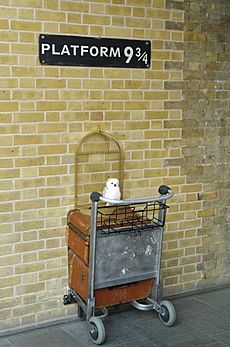
Joanne Rowling was born on 31 July 1965 in Yate, Gloucestershire. Her parents, Anne and Peter Rowling, met on a train. They were both in the Navy. Her father worked his way up to become a chartered engineer. Her mother later worked as a science technician. Joanne is two years older than her sister, Dianne.
When she was four, her family moved to Winterbourne, Gloucestershire. She started primary school there at age five. The Rowlings lived near a family named Potter, a name Joanne always liked. Her home was full of books, and her parents read to her often. Her first story, "Rabbit," was written when she was six. It was inspired by Richard Scarry's animal books.
Around age nine, her family bought Church Cottage in Tutshill. She joined a Brownies group in 1975. The magical themes of the Brownies gave her a fun escape. When she was eleven or twelve, she wrote a short story called "The Seven Cursed Diamonds." She described herself as a "bookish child" who lived in daydreams.
School and University Years
Rowling went to Wyedean School and College for secondary school. She was sometimes bullied there. Her favorite teacher, Lucy Shepherd, taught her how important structure and exactness are in writing. Her teacher Dale Neuschwander was impressed by her imagination. As a teenager, her great-aunt gave her a book about Jessica Mitford, who became her hero.
Her mother, Anne, was a big influence. She was creative and helped with her daughters' Brownie activities. Anne worked in the chemistry department at Wyedean School. Anne was diagnosed with a serious illness when Joanne was 15. Rowling's home life was difficult because of her mother's illness and problems with her father. She later said her teenage years were unhappy. She started smoking and liked alternative rock music. Her best friend, Sean Harris, had a turquoise Ford Anglia car. This car helped them escape from her difficult home life.
Rowling became more focused on her schoolwork. She got good grades in English, French, and German. She was also named head girl at Wyedean. She applied to Oxford University but was not accepted.
Rowling always wanted to be a writer. But she chose to study French and classics at the University of Exeter. Her parents thought these subjects would help her find a job. She said she enjoyed university after meeting people like her. She was an average student and preferred reading books by Dickens and Tolkien. She graduated in 1987 with a degree in French.
Inspiration and Mother's Passing
After university, Rowling moved to London and took a course to become a bilingual secretary. She worked in temporary jobs. Amnesty International hired her to write about human rights issues. She started writing adult novels during this time, but they were never published. In 1990, she was on a train from Manchester to London that was delayed. During this delay, the characters Harry Potter, Ron Weasley, and Hermione Granger came clearly into her mind. She had no pen or paper, so she thought about the story fully before writing it down.
Rowling moved to Manchester in late 1990. She described this time as a "year of misery." Her mother passed away on 30 December 1990. This event deeply affected Rowling's writing. She later said there was a clear connection between her writing about death and her own life.
After her mother's death and the end of a relationship, Rowling moved to Porto, Portugal, in November 1991. She taught English at night and wrote during the day.
Marriage, Divorce, and Single Parenthood
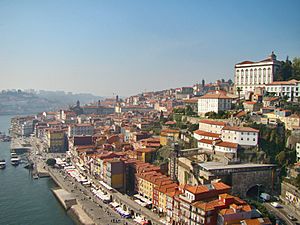
In Porto, Rowling met Jorge Arantes, a Portuguese journalist. They married on 16 October 1992. Their daughter, Jessica Isabel Rowling Arantes, was born on 27 July 1993. By this time, Rowling had finished the first three chapters of Harry Potter and the Philosopher's Stone.
Rowling and Arantes separated on 17 November 1993. She moved with her daughter to Edinburgh, Scotland. She received government help, about £69 (US$103) per week. She described herself as "poor as it is possible to be in modern Britain, without being homeless." She felt like a failure but later said this difficult time helped her focus on writing. She said her daughter, Jessica, "kept me going." Her friend, Sean Harris, lent her money to move to a new flat. There, she finished Philosopher's Stone.
Rowling faced a deep depression and sought medical help. Her mental health slowly improved with therapy. She filed for divorce on 10 August 1994, and it was finalized on 26 June 1995.
She wanted to finish her book before starting a teacher training course. She often wrote in cafés. In mid-1995, a friend gave her money, allowing her to stop receiving benefits and enroll in college full-time. She started a teacher training course in August 1995 and earned her teaching certificate in July 1996. She then began teaching. Rowling later said that writing the first Harry Potter book saved her life.
Publishing Harry Potter
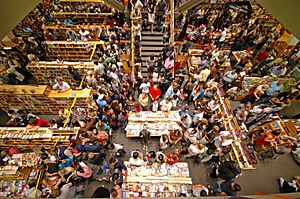
Rowling finished Harry Potter and the Philosopher's Stone in June 1995. Her agent sent the book to twelve publishers, but all of them rejected it. Barry Cunningham at Bloomsbury Publishing decided to buy it. He did so after Nigel Newton's eight-year-old daughter loved reading the first chapter. Bloomsbury published Philosopher's Stone on 26 June 1997.
The book introduces Harry Potter, a wizard who lives with his non-magical relatives. On his eleventh birthday, he is invited to Hogwarts School of Witchcraft and Wizardry. Rowling wrote six more books about Harry's adventures with his friends Hermione Granger and Ron Weasley. They try to defeat Lord Voldemort, who killed Harry's parents.
Scholastic Corporation bought the rights to publish the book in the US for $105,000. Rowling used this money to buy a flat in Edinburgh. Scholastic wanted to change the title to Harry Potter and the School of Magic. As a compromise, Rowling suggested Harry Potter and the Sorcerer's Stone. This version was released in the United States in September 1998. It quickly became a New York Times bestseller.
The next three books came out quickly between 1998 and 2000, selling millions of copies. Harry Potter and the Order of the Phoenix was published in June 2003. It sold millions of copies on its first day. Harry Potter and the Half-Blood Prince came out two years later in July 2005, also selling millions on its first day. The series ended with Harry Potter and the Deathly Hallows, published in July 2007.
Harry Potter Films
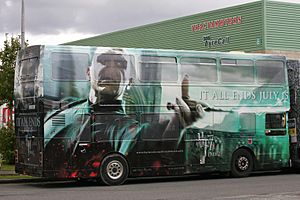
In 1999, Warner Bros. bought the film rights for the first two Harry Potter books. Rowling agreed, but only if the studio made films based on her books. She also wanted to approve the scripts and have some control over merchandise. Harry Potter and the Philosopher's Stone was released in November 2001. Steve Kloves wrote most of the screenplays with Rowling's help.
The film series finished with Harry Potter and the Deathly Hallows, which was split into two parts. Part one came out on 19 November 2010, and part two on 15 July 2011.
In 2013, Warner Bros. announced more films based on Rowling's character Newt Scamander. He is the author of Fantastic Beasts and Where to Find Them. The first film, a prequel to Harry Potter, was released in November 2016. Rowling wrote the screenplay for it. Crimes of Grindelwald came out in November 2018. Secrets of Dumbledore was released in April 2022.
Wealth and Remarriage
By 1998, the media often called Rowling a "penniless divorcee who hit the jackpot." This publicity helped market Harry Potter. But her journey from poverty to wealth also brought questions about the books' themes.
Rowling identifies as a Christian. She married Neil Murray, a doctor, in 2001. They had a small, private wedding on 26 December 2001. Their son, David Gordon Rowling Murray, was born in 2003. Their daughter, Mackenzie Jean Rowling Murray, was born in 2005.
In 2004, Forbes magazine called Rowling "the first billion-dollar author." She denied being a billionaire in 2005. By 2012, Forbes said she was no longer a billionaire because of her large donations to charity and high UK taxes. However, she was added back to the list of billionaires in 2025. She was named the world's highest-paid author by Forbes in 2008, 2017, and 2019. As of 2020, she owns homes in Kensington and Edinburgh.
Adult Books and Robert Galbraith
In 2011, Rowling changed literary agents. Her new agent, Neil Blair, represented her for The Casual Vacancy. This book was released in September 2012. It was her first book for adults and her first since the Harry Potter series ended. It was later made into a miniseries by the BBC and HBO.
In April 2013, a book called The Cuckoo's Calling was published. It was said to be by a new author named Robert Galbraith. The book is about a detective named Cormoran Strike. It first sold only 1,500 copies. Later, a journalist found out that Robert Galbraith was actually J. K. Rowling. After this was revealed, sales of Cuckoo's Calling greatly increased. Rowling said she enjoyed writing as Robert Galbraith. She chose the name from Robert F. Kennedy, a hero of hers, and Ella Galbraith, a name she made up as a child.
She continued the Cormoran Strike detective series with more books: The Silkworm (2014), Career of Evil (2015), Lethal White (2018), Troubled Blood (2020), The Ink Black Heart (2022), and The Running Grave (2023). In 2017, BBC One started a TV series called Strike based on these novels.
Later Harry Potter Works
In 2011, Rowling launched Pottermore. This was a website for e-books and interactive content about the Harry Potter world. She published articles about the universe there. In 2019, the site became Wizarding World Digital, now called HarryPotter.com.
Harry Potter and the Cursed Child is a stage play that opened in London in May 2016. Rowling worked with writer Jack Thorne and director John Tiffany on it. The play's script was published as a book in July 2016. It follows the friendship between Harry's son Albus and Scorpius Malfoy, Draco Malfoy's son, at Hogwarts.
In April 2023, a new Harry Potter television series was announced. It will start in 2026 and have one season for each of the seven books. Rowling is an executive producer for the series.
Children's Stories
The Ickabog was Rowling's first children's book since Harry Potter. It's about a monster that turns out to be real. A group of children discover the truth and save the day. Rowling released The Ickabog for free online in mid-2020 during the COVID-19 lockdown. She started writing it in 2009 but put it aside. Scholastic held a competition for children's art for the printed book. Profits from the book went to charities helping with COVID-19 relief.
In The Christmas Pig, a young boy loses his favorite stuffed pig. A new Christmas Pig guides him through a magical land to find it. This book was published on 12 October 2021 and became a bestseller.
Influences on J. K. Rowling
Rowling has said that Jessica Mitford was her greatest influence. She admired Mitford for being rebellious, brave, and funny. As a child, Rowling read books by C. S. Lewis (The Chronicles of Narnia), Elizabeth Goudge (The Little White Horse), Paul Gallico (Manxmouse), E. Nesbit, and Noel Streatfeild. Rowling calls Jane Austen her "favorite author of all time."
Rowling also recognizes Homer, Geoffrey Chaucer, and William Shakespeare as literary influences. Experts agree that Harry Potter is greatly influenced by children's fantasy writers like Lewis, Goudge, Nesbit, J. R. R. Tolkien, Ursula K. Le Guin, and Diana Wynne Jones. Commentators also see similarities to stories by Enid Blyton and Roald Dahl.
Rowling's idea of a "school of witchcraft and wizardry" is different from older stories where characters learn magic from a single teacher. However, Harry does get special lessons from teachers like Remus Lupin. Rowling also uses ideas from boarding school stories, like Tom Brown's School Days.
Writing Style and Themes
Style and Hidden Meanings
Rowling is mostly known for writing fantasy and children's literature. Her other books, like her adult novel and detective stories, have received less attention. Harry Potter has been called a fairy tale, a coming-of-age story, and a boarding-school story. Her other writings are described as realistic modern fiction and detective stories.
In Harry Potter, Rowling mixes the ordinary with the magical. Her stories have two worlds: the normal one and the magical one. But unlike typical fantasy, the magic stays connected to everyday life. Paintings move, books bite, and letters shout messages. This makes the wizarding world feel both exciting and familiar. Harry himself is an ordinary and relatable character. This helps to highlight his heroic moments, making him both a normal person and a fairytale hero.
Rowling's writing often includes ideas from Arthurian legends, Christian stories, and fairytales. Harry pulling the Sword of Gryffindor from the Sorting Hat is like the sword in the stone legend. His life with the Dursleys has been compared to Cinderella. Like C. S. Lewis's The Chronicles of Narnia, Harry Potter has Christian symbols and hidden meanings. Some see the series as a Christian story about good and evil fighting for a person's soul.
Main Themes
Death is a very important theme in Harry Potter. Rowling said that her magical Mirror of Erised is about her mother's death. In the first book, Harry feels both joy and sadness when he sees his parents alive in the mirror. Dealing with their loss is key to Harry's journey. Other characters in Harry's life also pass away. He even faces his own death in Harry Potter and the Deathly Hallows. Rowling said that after her mother died, death became a main theme in all seven books. She described Harry as "the way I view death."
While Harry Potter is about good versus evil, the lines between them are not always clear. First impressions of characters can be wrong. In Rowling's world, good and evil are choices, not something you are born with. Second chances and forgiveness are important ideas in the series.
Legacy of J. K. Rowling
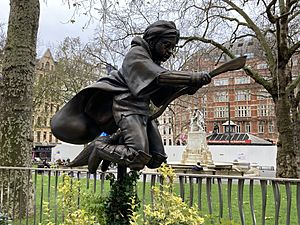
Rowling's Harry Potter series is known for making children's books popular with adults again. This kind of "crossover" fiction was common in the 1800s but less so in the 1900s. The success of Harry Potter in 1997 changed this. Its growth in the children's book market was huge. Children's literature gained more cultural importance, and fantasy became a very popular type of book. Older children's fantasy books were reprinted and became popular again. Many books that copied Harry Potter or responded to it also became popular.
Rowling has been compared to Enid Blyton, who also wrote simple stories about groups of children. She has also been called an heir to Roald Dahl. Some critics think Harry Potter's popularity, along with Philip Pullman's His Dark Materials, shows a shift in reading tastes. People started preferring exciting plots and adventures over more literary fiction.
The popularity of Harry Potter led publishers to plan big release events. They coordinated selling the books at the same time around the world. They also had security rules to stop people from buying copies too early. The growth of the internet led to many fan-made stories about the series. Rowling has supported fan fiction.
Legal Matters
Rowling has been involved in lawsuits about copyright infringement. In 1999, Nancy Stouffer sued Rowling, saying Harry Potter was based on her stories. Rowling won the case in 2002. The court found that Stouffer had used "forged and altered documents."
Rowling and her publishers have also taken legal action against people who tried to copy Harry Potter books. They have also gotten court orders to stop books from being sold or reviewed before their official release dates.
In 2007, Rowling and Warner Bros. tried to stop a book based on a fan website called The Harry Potter Lexicon from being published. The court said the book was not a fair use of Rowling's material. However, it did not stop the book from being published in a different form. Lexicon was published in 2009.
Helping Others (Philanthropy)
Rowling has always cared about issues affecting women and children. In 2000, she started the Volant Charitable Trust, named after her mother. This trust helps women, children, and young people who are in need. In 2004, she became president of One Parent Families (now Gingerbread).
In 2005, Rowling co-founded the charity now called Lumos. Lumos works with orphanages in places like Ukraine, Romania, and Haiti. By 2025, it had helped at least 280,000 children. She has also given money to help women lawyers escape from the Taliban's control in Afghanistan. In 2022, Rowling said she had started and would fund Beira's Place. This is a center that provides free support to women who have experienced violence.
Rowling has also given money to support medical causes. In 2010, she donated £10 million to start a multiple sclerosis research center at the University of Edinburgh. She gave another £15.3 million to the center in 2019. During the 2012 Summer Olympics opening ceremony, she read from Peter Pan as part of a tribute to the Great Ormond Street Hospital for Children. To help with COVID-19 relief, she donated large sums of money from the royalties of The Ickabog.
Several books in the Harry Potter world have been sold for charity. Profits from Fantastic Beasts and Where to Find Them and Quidditch Through the Ages went to Comic Relief. In 2007, Rowling sold a special copy of The Tales of Beedle the Bard at auction to help Children's Voice (later Lumos). Amazon bought it for £1.95 million, a record for a modern book. Rowling published the book, and in 2013, she donated almost £19 million (about $30 million) from its sales to Lumos.
In 2008, Rowling and 12 other writers wrote short pieces to benefit Dyslexia Action and English PEN. Rowling's contribution was an 800-word Harry Potter prequel. When it was revealed that Rowling wrote The Cuckoo's Calling, sales increased. She donated the royalties to ABF The Soldiers' Charity.
Forbes estimated that Rowling's charitable donations between 2005 and 2025 were over $200 million. She was the second most generous UK donor in 2015, giving about $14 million.
J. K. Rowling's Views
Rowling has been active on the internet, especially on Twitter, to connect with her Harry Potter fans. She often uses sarcasm in her tweets about her political opinions, which sometimes causes debate.
Politics
In 2008, Rowling donated £1 million to the Labour Party. She supported the Labour prime minister Gordon Brown. In June 2024, she said it would be hard for her to vote for Labour because of their stance on certain social issues. When asked about the 2008 United States presidential election, she said it was a shame that Clinton and Obama had to be rivals because both were amazing.
In 2010, Rowling criticized Prime Minister David Cameron's plan to offer married couples a tax credit. She felt it was unfair to single parents. Rowling was against Scottish independence in 2014. She donated £1 million to the campaign that wanted Scotland to stay part of the UK. She also campaigned for the UK to stay in the European Union in the 2016 United Kingdom European Union membership referendum. She said she was an internationalist and worried that "racists and bigots" were influencing the campaign to leave.
She opposed Israeli prime minister Benjamin Netanyahu. However, she refused to support a cultural boycott of Israel in 2015. She believed that stopping shared culture would not help. In 2015, Rowling signed a letter supporting cultural engagement with Israel.
Relationship with the Press
Rowling has had a difficult relationship with the press. She has tried to control the kind of stories written about her. In 2003, she said she was "too thin-skinned." By 2011, she had taken more than 50 actions against the press. Rowling dislikes the British newspaper Daily Mail. She successfully sued them in 2014 for writing false information about her time as a single mother.
The Leveson Inquiry, which looked into the British press, named Rowling as a key person in 2011. She was one of many famous people who were thought to be victims of phone hacking. In 2012, she criticized the government's decision not to follow all the inquiry's suggestions. She supported a campaign for stricter media rules.
Awards and Honors
Rowling's Harry Potter series has won many awards for general literature, children's literature, and fantasy. It has won several British Book Awards. The third book, Prisoner of Azkaban, was nominated for an adult award, the Whitbread Book of the Year. She won the World Science Fiction Convention's Hugo Award for the fourth book, Goblet of Fire.
Rowling was made an Officer of the Order of the British Empire (OBE) in 2000 for her services to children's literature. Three years later, she received Spain's Prince of Asturias Award for Concord. After the Harry Potter series ended, she won the Outstanding Achievement Prize at the 2008 British Book Awards. The next year, she received the Chevalier de la Légion d'Honneur from the French president Nicolas Sarkozy. In 2010, leading magazine editors named her the "Most Influential Woman in the UK." In 2017, Rowling was made a Member of the Order of the Companions of Honour (CH) for her work in literature and helping others.
Many universities have given Rowling honorary degrees, including her own university, the University of Exeter, and Harvard University. In 2002, she became a Fellow of the Royal Society of Literature (FRSL). In 2011, she was recognized as a Fellow of the Royal College of Physicians of Edinburgh (FRCPE).
Rowling shared the British Academy Film Award (BAFTA) for Outstanding British Contribution to Cinema in 2011 with the cast and crew of the Harry Potter films. She also won the 2017 Laurence Olivier Award for Best New Play for Harry Potter and the Cursed Child. In 2021, she won the British Book Awards' Crime and Thriller prize for the fifth book in her Cormoran Strike series.
Filmography
Film
| Year | Title | Credited as | Notes | ||
|---|---|---|---|---|---|
| Screenwriter | Producer | ||||
| 2010 | Harry Potter and the Deathly Hallows – Part 1 | No | Yes | Film based on Harry Potter and the Deathly Hallows | |
| 2011 | Harry Potter and the Deathly Hallows – Part 2 | No | Yes | ||
| 2016 | Fantastic Beasts and Where to Find Them | Yes | Yes | Films inspired by the Harry Potter supplementary book Fantastic Beasts and Where to Find Them | |
| 2018 | Fantastic Beasts: The Crimes of Grindelwald | Yes | Yes | ||
| 2022 | Fantastic Beasts: The Secrets of Dumbledore | Yes | Yes | ||
Television
| Year | Title | Credited as | Notes | ||
|---|---|---|---|---|---|
| Voice actress | Executive producer | ||||
| 2003 | The Simpsons | Yes | No | Voice cameo in "The Regina Monologues" | |
| 2015 | The Casual Vacancy | No | Yes | Television miniseries based on The Casual Vacancy | |
| 2017–present | Strike | No | Yes | Television series based on Cormoran Strike novels | |
| 2027 | Harry Potter | No | Yes | Television series based on Harry Potter novels; filming | |
Interesting Facts About J. K. Rowling
- When she was born, Rowling had no middle name.
- Joanne's first story was called "Rabbit." She wrote it at age six. It was inspired by Richard Scarry's animal books.
- When she was eleven or twelve, she wrote a short story called "The Seven Cursed Diamonds."
- In secondary school, Rowling wanted to play heavy electric guitar. She was smart but shy.
- As a young teenager, her great-aunt gave her Hons and Rebels. This was the autobiography of civil rights activist Jessica Mitford. Mitford became Rowling's hero. She read all of Mitford's books.
- As a child, Rowling read The Chronicles of Narnia by C. S. Lewis. She also read The Little White Horse by Elizabeth Goudge. Other favorites included Manxmouse by Paul Gallico. She also enjoyed books by E. Nesbit and Noel Streatfeild.
- Rowling says Jane Austen is her "favorite author of all time."
- She also acknowledges Homer, Geoffrey Chaucer, and William Shakespeare as literary influences.
- The Casual Vacancy (2012) was her first novel written for adults.
- She writes the Cormoran Strike crime fiction series. She uses the pen name Robert Galbraith for these books.
- Rowling identifies as a Christian. She does not believe in magic or witchcraft.
- In 2004, Forbes named Rowling "the first billion-dollar author." By 2012, Forbes said she was no longer a billionaire. This was due to her charitable donations and high UK taxes.
- She was named the world's highest-paid author by Forbes in 2008, 2017, and 2019.
- Her UK sales are over £238 million. This makes her the best-selling living author in Britain.
- In 2021, the Sunday Times Rich List estimated Rowling's fortune at £820 million. This ranked her as the 196th-richest person in the UK.
- As of 2020, she owns a £4.5 million Georgian house in Kensington. She also owns a £2 million home in Edinburgh.

J. K. Rowling Quotes
- “If you want to know what a man's like, take a good look at how he treats his inferiors, not his equals.”
- “It matters not what someone is born, but what they grow to be.”
- “The truth. It is a beautiful and terrible thing, and must therefore be treated with great caution.”
- “Indifference and neglect often do much more damage than outright dislike.”
Images for kids
See also
 In Spanish: J. K. Rowling para niños
In Spanish: J. K. Rowling para niños


